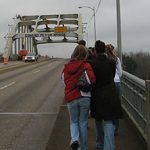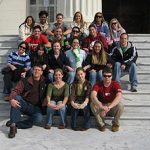The Isabella Cannon Leadership Fellows Class of 2009 recently returned from a week in Georgia and Alabama to learn about the people, places and events that shaped the American civil rights movement. Details...
 Jim Bissett, professor of history, and Rex Waters, associate dean of students, led the trip.
Jim Bissett, professor of history, and Rex Waters, associate dean of students, led the trip.
Before departing for the trip, the Fellows read several texts about the civil rights movement, including “Eating Dr. King’s Dinner” by Chuck Fager, “Cradle of Freedom” by Fred Gaillard, and “The Informant” by Gary May. They watched films about the movement and discussed the key people who took part.
In Alabama, the class made stops in Birmingham, Selma and Montgomery. The group visited important landmarks in the civil rights effort, including the Birmingham Civil Rights Museum and Birmingham’s 16th Street Baptist Church, where four girls were killed in a 1963 bombing.
Students traveled to Selma and toured the Slavery and Civil War Museum, the National Voting Rights Museum, and walked across the Edmund Pettus Bridge, above, where police attacked peaceful protesters in 1965 on what became known as Bloody Sunday. The class traveled the same route from Selma to Montgomery used by Martin Luther King, Jr., and hundreds of protestors to fight for voting rights at the state capitol.
In Montgomery, the Fellows stood where King led a protest for voting rights, which ironically is the same spot where Jefferson Davis was inaugurated as President of the Confederacy. The class toured the parsonage at Dexter Avenue Baptist Church, site of a failed assassination attempt against King, the Rosa Parks Museum and the Civil Rights Memorial.
 In Atlanta, the Fellows toured the Martin Luther King, Jr. Memorial Site, which contains a museum, the King Center and Freedom Center. The group also visited King’s gravesite, birthplace, and Ebenezer Baptist Church, site of King’s funeral.
In Atlanta, the Fellows toured the Martin Luther King, Jr. Memorial Site, which contains a museum, the King Center and Freedom Center. The group also visited King’s gravesite, birthplace, and Ebenezer Baptist Church, site of King’s funeral.
The Fellows put their education into action by visiting the key landmarks of the civil rights movement. They learned about the movement, its leaders, and the use of non-violence as a form of protest. The dedication and passion of the civil rights leaders serve as a model for today’s leaders as well as tomorrow’s.


